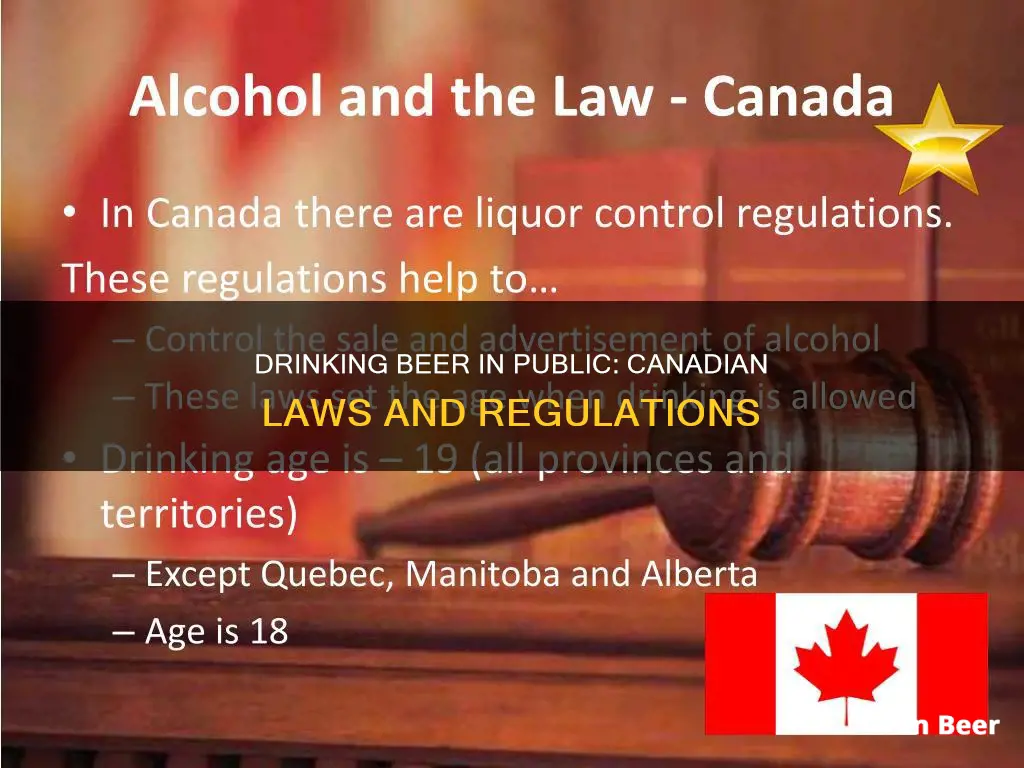
Drinking in public is a confusing topic in Canada, with varying rules at federal, provincial, and municipal levels. The federal government has only one public drinking-related law, while all the provinces and many cities have enacted their own distinct laws. In Canada, except for Quebec, possession of open containers of alcohol in public is generally a violation of provincial acts and municipal bylaws. Drinking in public parks is not permitted in most provinces, though some cities have introduced licensed parts of public parks where drinking is allowed. Drinking laws vary across the country, and fines for drinking in public range from $100 to $672.
| Characteristics | Values |
|---|---|
| Country | Canada |
| Federal Law | Public drunkenness is illegal if it causes a disturbance, with penalties of up to six months in jail or a $5,000 fine |
| Provincial Laws | Each province is responsible for its own liquor laws. With the exception of Quebec, possession of open containers of alcohol in public is illegal. |
| Municipal Laws | Vary by city, e.g. Toronto prohibits alcohol in parks and beaches, with fines up to $300 |
| Open Container Laws | Alcohol in an open container in a vehicle is illegal unless stored in a secure compartment |
| Fines | Vary by province, ranging from $100 to $672 for being caught with an open container in public |
| Age Limit | 18 in Alberta, Manitoba, and Quebec; 19 in all other provinces |
What You'll Learn
- Drinking in public is a violation of provincial acts and municipal bylaws in most Canadian provinces excluding Quebec
- Drinking in public is permitted in private residences or licensed premises like bars and restaurants
- Drinking in public parks is not allowed, although alcohol may be consumed in campsites and some provincial parks
- Drinking in public is illegal in Ontario under the Liquor License and Control Act, with fines ranging from $100 to $175
- In Alberta, municipal laws designate locations within public parks where individuals may consume alcohol

Drinking in public is a violation of provincial acts and municipal bylaws in most Canadian provinces excluding Quebec
In Canada, each province is responsible for creating its own liquor laws. With the exception of Quebec, possession of open containers of alcohol in public is generally prohibited. Open liquor is only permitted in private residences or on licensed premises. This includes bars and restaurants. Drinking alcohol in public parks is also not allowed, despite these spaces being attractive venues for consuming alcoholic drinks. However, some provinces have loosened outdoor drinking rules, and drinking laws can vary depending on the jurisdiction. For example, in some provinces, drinking in provincial campgrounds is allowed. Additionally, drinking on a plane or train is permitted, but not on other forms of public transportation or while operating a boat.
The fines for drinking in public vary across Canada. In Ontario, for instance, drinking in public can result in fines ranging from $100 to $175. In Toronto, drinking in parks and beaches is prohibited, with fines of up to $300. In British Columbia and Ontario, being caught with an open container or consuming liquor in a public place can result in a fine, as per the Liquor Licence Act. In Quebec, the laws on alcohol consumption in public are more relaxed than in the rest of Canada. For example, in Montreal, drinking alcohol in public parks while accompanied by food is allowed, and the police generally do not check for food.
It is important to note that public drunkenness is also considered a serious offence in Canada. According to the Criminal Code of Canada, causing an alcohol-induced disturbance that interrupts the public peace is a criminal activity. This can include behaviours such as shouting, fighting, or public urination. If an individual is drunk in a bar or other licensed venue and causes a disturbance, they can be expelled from the establishment and potentially taken into police custody. In some cases, being drunk in public, even without causing a disturbance, can result in a fine or other charges.
Non-Alcoholic Beer: Impact on Triglyceride Levels?
You may want to see also

Drinking in public is permitted in private residences or licensed premises like bars and restaurants
Drinking in public is a confusing topic in Canada, with varying rules at the federal, provincial, and municipal levels. While drinking in bars and restaurants is allowed, drinking in public parks is not permitted. Drinking in public is only permitted in private residences or licensed premises.
Each province in Canada is responsible for its liquor laws, except for Quebec, where possession of open containers of alcohol in public is allowed. In the rest of Canada, drinking in public violates provincial laws and municipal bylaws. However, you may be able to drink in provincial campgrounds, and some provinces relaxed outdoor drinking rules during the coronavirus pandemic.
Open liquor refers to a broken seal or an open bottle. Generally, open liquor is only permitted in private residences, licensed establishments, or events that require licensing. Drinking on a plane or train is allowed, but not on public transportation or while operating a boat. It is important to note that drinking and driving is illegal. If you are driving and your passengers have open containers, you can be charged and fined. Fines differ across provinces and can range from $100 to $672 for being caught with open liquor in public.
To clarify, drinking in public is not illegal in all Canadian provinces. In Ontario, for example, drinking in public carries fines ranging from $100 to $175. However, in Toronto, which is in Ontario, municipal rules prohibit alcohol in parks and beaches, with fines up to $300. It is crucial to be aware of the specific laws and regulations in your province and municipality to avoid any confusion or legal consequences.
In summary, while drinking in licensed establishments like bars and restaurants is permitted in Canada, drinking in public spaces like parks is generally not allowed. The only exception is Quebec, which has more relaxed laws regarding public consumption of alcohol. It is important to be mindful of the legal and social consequences of drinking in public and to consume alcohol responsibly.
Beer and Colon Prep: Is It Safe to Drink?
You may want to see also

Drinking in public parks is not allowed, although alcohol may be consumed in campsites and some provincial parks
Drinking in public parks is prohibited in Canada, except in some provincial parks and campsites. Alcohol consumption in public spaces is generally a violation of provincial acts and municipal bylaws. However, each province has its own liquor laws, and some have started to relax outdoor drinking rules.
In Ontario, public drinking is illegal under the Liquor License and Control Act, with fines ranging from $100 to $175. However, alcohol is permitted on campsites in Ontario Provincial Parks as they are considered temporary residences. In Quebec, drinking laws are more relaxed than in the rest of Canada. Alcohol may be consumed in public parks when accompanied by food, although this rule is not strictly enforced. In Alberta, some municipalities have designated specific areas within public parks where alcohol consumption is allowed.
It is important to note that drinking laws can vary between cities and even specific parks, so it is essential to check the regulations for your specific location. While drinking in public parks is generally prohibited, alcohol may be consumed in campsites and some provincial parks in Canada.
A Day at the Beer Hall: A Beginner's Guide
You may want to see also

Drinking in public is illegal in Ontario under the Liquor License and Control Act, with fines ranging from $100 to $175
Drinking in public is illegal in Ontario under the Liquor License and Control Act, and those found drinking in public spaces can expect to pay fines ranging from $100 to $175.
In Canada, drinking in public is a confusing topic, with varying rules at the federal, provincial, and municipal levels. While public drunkenness is only illegal under federal law if it causes a disturbance, each province and city has its own distinct laws. For example, in Quebec, drinking in public parks is permitted as long as it is accompanied by food, whereas in Ontario, drinking in public carries a fine.
In Ontario, the Liquor License and Control Act of 2019 addresses alcohol consumption, including around 30 offences related to public consumption and possession, with fines ranging from $100 to $175. The Act states that no person shall "have or consume liquor in any place other than: premises in respect of which a license or permit that permits consumption is issued; a private place as described by the regulations; or a public place designated by a by-law made by the council of a municipality".
It is important to note that drinking in public does not only refer to outdoor spaces such as roads, walkways, and parks, but also includes drinking in a moving vehicle. While you may drink on a plane or train, it is illegal to drink while operating a boat or vehicle.
The rules regarding drinking in public in Canada can be complex and are constantly evolving, so it is essential to stay informed about the specific laws in your province and municipality.
Drinking Beer as a Passenger: What's the Legal Verdict?
You may want to see also

In Alberta, municipal laws designate locations within public parks where individuals may consume alcohol
Drinking in public in Canada is a complex issue, with rules varying at the federal, provincial, and municipal levels. Generally, possession of an open container of alcohol in public violates provincial laws and municipal bylaws, except in Quebec, where drinking in public parks is permitted as long as it is accompanied by food. Drinking alcohol in public is illegal in Ontario under the Liquor License and Control Act, with fines ranging from $100 to $175. However, in Alberta, there have been some interesting developments in this area.
In 2020, amendments to the Gaming, Liquor, and Cannabis Act enabled municipalities in Alberta to designate locations within public parks where individuals may consume alcohol without being accompanied by a meal. This change was implemented to help Albertans cope with the pandemic and resulted in a fairly minor shift in how community members engage in public spaces. The cities of Edmonton and Calgary took advantage of this opportunity and ran full pilot programs in the summer of 2021, allowing public drinking in certain parks.
The City of Edmonton's pilot program ran from May 28 to October 11, 2021, in seven river valley parks, with alcohol consumption permitted at 47 picnic sites. The sites could be booked ahead of time or accessed on a first-come, first-served basis. The City of Calgary's pilot program offered a similar arrangement, with 58 tables across the city where alcohol consumption was permitted.
The feedback from these pilot programs was mostly positive, with the vast majority of respondents reporting that they did not encounter disorderly conduct, noise, or litter issues. As a result, the City of Edmonton decided to reinstate and expand the program for the summer of 2022, allowing alcohol consumption in parks outside the river valley but restricting it to picnic sites. Calgary also recommended continuing the program with some adjustments, such as focusing on higher-uptake locations around the downtown core.
These developments in Alberta represent a slow evolution in drinking culture in large Canadian cities, where alcohol consumption has traditionally been a highly regulated activity occurring mostly in private spaces. While there was some opposition from community members, the pilot programs indicate that many people are prepared for this change and that it is possible to mitigate concerns raised by residents. However, it is important to note that public drinking laws can vary significantly across different provinces and municipalities in Canada, and individuals should be aware of the specific regulations in their area to avoid fines or legal consequences.
Lip Fillers and Beer: What's Safe to Drink?
You may want to see also
Frequently asked questions
No, drinking beer in public in Canada is generally prohibited.
In Canada, except for Quebec, possession of open containers of alcohol in public is generally a violation of provincial acts and municipal bylaws. Open liquor is permitted only in private residences or on licensed premises.
The penalty for drinking in public in Canada varies by province and municipality. In Ontario, drinking in public carries fines from $100 to $175. In Toronto, drinking in parks and beaches is prohibited and can result in fines up to $300. In British Columbia and Ontario, those caught drinking in public may be forced to pour out the alcoholic beverage and may receive a verbal warning or a fine.
Drinking alcohol on public transportation is prohibited in Canada. However, you can drink on a plane or train.
Drinking alcohol in parks is generally not permitted in Canada. However, there are some exceptions. For example, in Quebec, drinking alcohol in public parks while accompanied by food is allowed. Additionally, some cities in Canada have introduced licensed parts of public parks where alcohol consumption is permitted.







